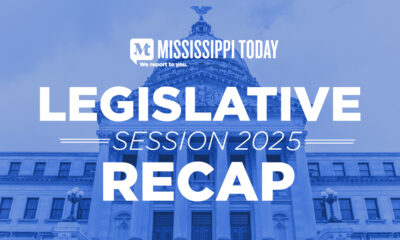Mississippi Today
Gov. Tate Reeves’ brother used backchannel to state auditor to help clean up Brett Favre welfare mess

Gov. Tate Reeves’ brother coordinated with state Auditor Shad White on damage control for former NFL star Brett Favre after an audit first revealed in 2020 that the athlete had received more than $1 million in welfare funds, according to text messages the governor’s political campaign released Thursday.
Todd Reeves, Favre’s friend, had also arranged conversations in early 2020 with Gov. Reeves so that Favre could ask for the governor’s help in funding the University of Southern Mississippi volleyball stadium, one of the centerpieces of the ongoing welfare scandal.
The texts released Thursday show how, on Favre’s behalf, Todd Reeves facilitated the athlete’s repayment of some of the funds and asked for White to make a public statement that “the investigation (shows to this point) Brett has done nothing wrong.”
Meanwhile, attorneys for the state auditor’s office and the attorney general’s office have fought for eight months to withhold these texts from Mississippi Today, who originally requested them. The state argued as recently as Wednesday the texts are part of their investigative file in the welfare case, and publicly releasing them could harm the ongoing welfare scandal investigation.
But on Thursday, as Mississippi Today prepared its story about the withheld records, the Reeves campaign released what they say are the text messages in question.
After Mississippi Today reached out to Todd Reeves and Gov. Reeves’ campaign for comment about the texts and the state’s argument that they are evidence in an ongoing investigation, the Reeves campaign did not respond to the inquiry but instead sent out a media release chastising the news organization for covering the story. Todd Reeves also gave his own quote for the campaign’s release.
“I’ve been friendly with Brett for years, and always heard great things about Shad,” Todd Reeves said in a press release Thursday, distributed by his brother’s gubernatorial campaign. “I didn’t learn anything about this TANF mess or Brett’s dealings with the state until it was front page news. When Brett was considering repaying the funds, he asked me if I could help him get in touch with the auditor to coordinate that–so that’s what I did. I helped money get back in the right hands, not the wrong hands, and I think that’s what most people would have done. Brett believed he had done nothing wrong, and I helped convince him to return the money anyway. Those are the texts in question. I know Mississippi Today is willing to lie about us, so I just wanted to get the truth out.”
Mississippi Today cannot verify if the Reeves campaign released all of the texts sought by the litigation because the news outlet has not been allowed to view the requested records. The Reeves campaign did not respond to follow-up questions about the completeness of the records they released on Thursday, and the attorney general’s office declined to comment.
The news organization first filed a public records request for texts between White and Todd Reeves in December 2022. Additionally, the request also included any of White’s messages or emails that made reference to Todd Reeves. Mississippi Today was denied the records and filed suit against the auditor’s office in January 2023.
Hinds County Chancery Court Judge Crystal Wise Martin reviewed the texts in private, on Mississippi Today’s request, to determine if the documents were, in fact, exempt from public release.
“They obviously relate to the DHS investigation,” Judge Martin said during a hearing Wednesday, after she had seen the records. “There’s no question about that.”
Special Assistant Attorney General Rex Shannon, representing the auditor’s office for the state, argued against releasing the texts on Wednesday, saying:
- “Their disclosure may harm that investigation by chilling similar communications in the future.”
- “The records in question reveal and confirm the identity of a potential witness.”
- “The records in question would potentially disclose investigatory techniques and or the results of those techniques.”
- “The records in question, if publicly produced, would potentially impede or jeopardize any prosecution of certain individuals that may result from the DHS investigation.”
White has said several times previously that he has turned over all welfare investigation-related material in his possession to the FBI. While the Mississippi Department of Human Services has sued Favre in its ongoing civil case, overseen by Gov. Reeves, Favre has not faced any criminal charges.
READ MORE: What exactly is Gov. Tate Reeves’ involvement in the welfare scandal?
In the early days of Gov. Reeves’ current term, Favre used Todd Reeves as a way to communicate with the governor. Favre, who endorsed Gov. Reeves in his election months earlier, was hoping the governor would help him find public funding to pay for the completed construction of a volleyball stadium at University of Southern Mississippi. Favre had made a guarantee to the university. If he didn’t find the funding somewhere, Favre would have to pay out of his own pocket. According to texts previously released, Todd Reeves would facilitate lines of communication for the athlete.
“Brett, you aren’t bothering me at all and please always feel free to reach out to me anytime,” Todd Reeves texted Favre, according to a previously released text Favre forwarded to Gov. Phil Bryant on Jan. 26, 2020. “I will help any way I can. I will be glad to set something up with Tate. Tell me kind of what the plan in place for funding is/was. Did Gov Bryant mention maybe trying to get it as part of a bond bill for the University?”
At this time, the USM project had already received at least $5 million in funding from the federal Temporary Assistance for Needy Families program, which is supposed to provide monthly cash assistance to very poor families, through a nonprofit run by Nancy New.
Within days and weeks of Favre’s communication with the Reeves brothers in early 2020, the auditor would arrest the two top welfare officials who had been working with Favre and the volleyball project would be outed as part of a sprawling scheme to misuse tens of millions of welfare funds.
White had taken a strong stance against the widespread corruption at MDHS leading up to the May 2020 release of his annual audit, which questioned almost $100 million worth of spending.
But in a press conference describing some of the more egregious findings, White did not draw attention to Favre, whose welfare payment, listed under Favre Enterprises, was tucked in a bullet list on page 18 of the 104-page report. Still, the revelation made national news.
Two days later, Favre repaid $500,000 of the $1.1 million and promised the auditor he would return the additional $600,000 in installments in the coming months. First, the texts show, White sent Todd Reeves the address of where to send the money, then they arranged for an agent to pick up a check at the office of Favre’s agent.
“If possible, Brett would like you to say something along the lines of “the investigation (shows to this point) Brett has done nothing wrong and the monies he is paying back for commercials and Psa’s is from his own good will,” Todd Reeves texted White on May 6, 2020.
White praised Favre in the statement he released the same day: “I want to applaud Mr. Favre for his good faith effort to make this right and make the taxpayers and TANF families whole. To date, we have seen no records indicating Mr. Favre knew that TANF was the program that served as the source of the money he was paid.”
A few weeks later, Todd Reeves texted White, “Just wanted to tell you I appreciate you talking and helping the last couple of weeks.”
The last text Todd Reeves produced Thursday was a message he sent the auditor in September of 2020.
“I think Brett is working to get some more money sent in,” Todd Reeves said. “He’s had some reporters start hounding them again. I’m sure they have contacted your office. He’s just asking not to be thrown under the bus as he is working within the timeline.”
But Favre did not return the remainder of the funds until White issued him an official demand more than a year later in October 2021. By that time, the auditor said Favre also owed $228,000 in interest.
Mississippi Today’s December 2022 records request to the auditor’s office asked for text messages and emails to examine how Todd Reeves, potentially on Favre’s behalf, may have communicated with White during this time period.
“We’re here arguing about the records that belong to the people of the state of Mississippi,” Henry Laird, Mississippi Today’s attorney, told the judge on Wednesday. “These are not the auditor’s records. These are Mississippi’s records. And unless there is an exemption that allows the auditor to say they shouldn’t be produced, they should be produced.”
Judge Martin did not rule whether to release the texts Wednesday. On Thursday, as she continued to decide how to rule and before Mississippi Today published its story about the hearing, the Reeves campaign chose to publicly release texts between Todd Reeves and White.
“While Mr. Reeves has the right to release his text messages, the State Auditor’s Office has not and will not release information regarding a potential or ongoing investigation to protect the integrity of an investigation,” Fletcher Freeman, a spokesperson for the auditor’s office, said in a statement Thursday. “The men and women of the State Auditor’s Office have worked tirelessly to hold those who steal taxpayer’s dollars accountable, and we will continue to work with prosecutors and our federal partners to do so.”
Acknowledging that the texts might not, on their face, appear to be part of an investigative file, Shannon, the state attorney, provided the judge in Wednesday’s hearing with auditor’s office press releases that relate to the content in the texts. Those included a release in May of 2020 about Favre repaying some of the $1.1 million in TANF funds he received; a release in October of 2021 about the auditor demanding the repayment of TANF funds from several people, including Favre for the remaining funds White said he owed; and a release about several guilty pleas in the case.
Mississippi Today’s records request asked for messages sent between Feb. 1, 2020, and June 1, 2020. In this timeframe, White made initial arrests in the welfare fraud case (Feb. 5), Mississippi Today published a story first uncovering that welfare funds had been used to build the volleyball stadium (Feb. 27), and White released his annual audit (May 4), which first revealed the direct welfare payment to Favre. The records request also asked for messages sent between Sept. 1, 2021 and Dec. 31, 2021. In this timeframe, the welfare agency released its commissioned forensic audit, which provided more details about the misspending and prompted White to issue the official demand for repayment from Favre.
In response to a separate request to Gov. Reeves for his texts with Favre prior to becoming governor in 2020, the governor’s office said it was not “in possession or control of any public records responsive to your request.” Before 2020, Reeves served as lieutenant governor in the Mississippi Senate. Generally speaking, lawmakers have used the legislative exemption in the Public Records Act to withhold records from reporters.
Asked about the volleyball stadium at Neshoba County Fair in the summer of 2022, Reeves suggested he didn’t support the idea of using any taxpayer funds to build sports facilities.
“Look I don’t know all the details as to how that came about,” he said. “What I do know is that it doesn’t seem like an expense that I would personally support for TANF dollars. I don’t even like the state building stadiums with general tax dollars.”
However, Favre and Bryant seemed confident Tate Reeves would help.
On election day in November 2019, Favre texted then-Gov. Bryant, “I know it’s Election Day and you are probably busy but while we know who our Governor is presently not to mention arguably the most popular and influential I want to stay on your radar. If our guy wins I’ll feel better about things but if the other guy wins I feel like Nancy and I can forget our vision for Southern Miss.”
“That’s one reason I have been pushing Tate so hard,” Bryant responded. “He has to win. Then we set up a meeting on Wellness Center at USM.”
Gov. Reeves did win, and in late January of 2020, Todd Reeves set up a phone call for Favre and the governor to discuss funding. About a week later, as White was preparing to make arrests, Favre expressed his desire to take Gov. Reeves to see the volleyball stadium, texting, “and it would only be us. I want you to see what your (sic) trying to help me for.”
It’s unclear if Gov. Reeves actually pushed to include funding for the facility in a legislative or other kind of appropriation, but his brother certainly gave Favre the impression that he would.
“I think the angle Tate is looking at is a bond bill according to Todd his brother,” Favre texted Bryant on Feb. 7, 2020, as the fallout from the arrests was still materializing.
READ MORE: Gov. Tate Reeves inspired welfare payment targeted in civil suit, texts show
This article first appeared on Mississippi Today and is republished here under a Creative Commons license.
Mississippi Today
Mississippi lawmakers end 2025 session unable to agree (or even meet about) state budget: Legislative recap
Infighting between Mississippi’s Republican House and Senate legislative leaders reached DEFCON 4 as the 2025 legislative session sputtered to a close last week.
Lawmakers gaveled out unable to set a $7 billion state budget — their main job — or to even agree to negotiate. Gov. Tate Reeves will force them back into session sometime before the end of the fiscal year June 30. At a press conference last week, the governor assured he would do so but did not give a timetable, other than saying he plans to give lawmakers some time to cool off.
The crowning achievement of the 2025 session was passage of a tax overhaul bill a majority of legislators accidentally voted for because of errors in its math. House leaders and the governor nevertheless celebrated passage of the measure, which will phase out the state individual income tax over about 14 years, more quickly trim the sales tax on some groceries to 5% raise the tax on gasoline by 9 cents a gallon, then have automatic gas tax increases thereafter based on the cost of road construction.
The error in the Senate bill accidentally removed safeguards that chamber’s leadership wanted to ensure the income tax would be phased out only if the state sees robust economic growth and controls spending.
The rope-a-dope the House used with the Senate errors to pass the measure also stripped a safeguard House leaders had wanted: a 1.5 cents on the dollar increase in the state’s sales tax, which would have brought it to 8.5%. House leaders said such an increase was needed to offset cutting more than $2 billion from the state’s $7 billion general fund revenue by eliminating the income tax, and to ensure local governments would be kept whole.
Reeves was nonplussed about the flaws in the bill he signed into law (at one point denying there were errors in it) and called it “One big, beautiful bill,” borrowing a phrase from President Donald Trump.
Quote of the Week
“Quite frankly, I think it’s chicken shit what they did.” — Gov. Tate Reeves, at a press conference last week when asked his thoughts about the Senate rejecting his nomination of Cory Custer, Reeves’ deputy chief of staff, to serve as four-year term on the board of Mississippi Public Broadcasting.
Full Legislative Coverage
What happened (or didn’t) in the rancorous 2025 Mississippi Legislative session?
Mississippi Today’s political team unpacks the just ended — for now — legislative session, that crashed at the end with GOP lawmakers unable to pass a budget after much infighting among Republican leaders. The crowning achievement of the session, a tax overhaul bill, was passed by accident and full of major errors and omissions. Listen to the podcast.
Gov. Tate Reeves, legislative leaders tout tax cut, but for some, it could be a tax increase
Many of those retirees who do not pay an income tax under state law and other Mississippians as well will face a tax increase under this newly passed legislation touted by Reeves and others. Read the column.
Trump administration slashes education funding. Mississippi leaders and schools panic
Mississippi schools and the state education system are set to lose over $137 million in federal funds after the U.S. Department of Education halted access to pandemic-era grant money, state leaders said this week. Read the story.
Gov. Tate Reeves says he’ll call Mississippi lawmakers back in special session after they failed to set budget
Gov. Tate Reeves on Thursday said he will call lawmakers into a special session to adopt a budget before state agencies run out of money later in the summer and hinted he might force legislators to consider other measures. Read the story.
GOP-controlled Senate rejects governor’s pick for public broadcasting board. Reeves calls it ‘chicken s–t’
The Senate on Wednesday roundly rejected the nomination of Cory Custer, Reeves’ deputy chief of staff, to serve a four-year term on the board of directors of Mississippi Public Broadcasting, the statewide public radio and television network. Reeves reacted to the Senate’s vote on Thursday, calling it “chicken shit.” Read the story.
Early voting proposal killed on last day of Mississippi legislative session
Mississippi will remain one of only three states without no-excuse early voting or no-excuse absentee voting. Read the story.
Mississippi Legislature ends 2025 session without setting a budget over GOP infighting
The House on Wednesday voted to end what had become a futile legislative session without passing a budget to fund state government, for the first time in 16 years. The Senate is expected to do the same on Thursday. Read the story.
Mississippi Legislature approves DEI ban after heated debate
Mississippi lawmakers have reached an agreement to ban diversity, equity and inclusion programs and a list of “divisive concepts” from public schools across the state education system, following the lead of numerous other Republican-controlled states and President Donald Trump’s administration. Read the story.
Fear and loathing: Legislative session crashes with lawmakers unable to set a budget because of Republican infighting
Republican Lt. Gov. Delbert Hosemann and other Senate leaders on Saturday excoriated the Republican House leadership, after the House didn’t show up for what was supposed to be “conference weekend” to haggle out a $7 billion budget. Read the story.
‘We’ll go another year’ without relief: Pharmacy benefit manager reform likely dead
Hotly contested legislation that aimed to increase the transparency and regulation of pharmacy benefit managers appeared dead in the water Tuesday after a lawmaker challenged the bill for a rule violation. Read the story.
This article first appeared on Mississippi Today and is republished here under a Creative Commons Attribution-NoDerivatives 4.0 International License.
The post Mississippi lawmakers end 2025 session unable to agree (or even meet about) state budget: Legislative recap appeared first on mississippitoday.org
Mississippi Today
On this day in 1909, Matthew Henson reached the North Pole
April 6, 1909

Matthew Henson reached the North Pole, planting the American flag. Traveling with the Admiral Peary Expedition, Henson reportedly reached the North Pole almost 45 minutes before Peary and the rest of the men.
“As I stood there on top of the world and I thought of the hundreds of men who had lost their lives in the effort to reach it, I felt profoundly grateful that I had the honor of representing my race,” he said.
While some would later dispute whether the expedition had actually reached the North Pole, Henson’s journey seems no less amazing.
Born in Maryland to sharecropping parents who survived attacks by the KKK, he grew up working, becoming a cabin boy and sailing around the world.
After returning, he became a salesman at a clothing store in Washington, D.C., where he waited on a customer named Robert Peary. Pearywas so impressed with Henson and his tales of the sea that he hired him as his personal valet.
Henson joined Peary on a trip to Nicaragua. Impressed with Henson’s seamanship, Peary made Henson his “first man” on the expeditions that followed to the Arctic. When the expedition returned, Peary drew praise from the world while Henson’s contributions were ignored.
Over time, his work came to be recognized. In 1937, he became the first African-American life member of The Explorers Club. Seven years later, he received the Peary Polar Expedition Medal and was received at the White House by President Truman and later President Eisenhower.
“There can be no vision to the (person) the horizon of whose vision is limited by the bounds of self,” he said. “But the great things of the world, the great accomplishments of the world, have been achieved by (people with) … high ideals and … great visions. The path is not easy, the climb is rugged and hard, but the glory at the end is worthwhile.”
Henson died in 1955, and his body was re-interred with full military honors at Arlington National Cemetery. The U.S. Postal Service featured him on a stamp, and the U.S. Navy named a Pathfinder class ship after him. In 2000, the National Geographic Society awarded him the Hubbard Medal.
This article first appeared on Mississippi Today and is republished here under a Creative Commons Attribution-NoDerivatives 4.0 International License.![]()
Mississippi Today
A win for press freedom: Judge dismisses Gov. Phil Bryant’s lawsuit against Mississippi Today
Madison County Circuit Court Judge Bradley Mills dismissed former Gov. Phil Bryant’s defamation lawsuit against Mississippi Today on Friday, ending a nearly two-year case that became a beacon in the fight for American press freedom.
For the past 22 months, we’ve vigorously defended our Pulitzer Prize-winning reporting and our characterizations of Bryant’s role in the Mississippi welfare scandal. We are grateful today that the court, after careful deliberation, dismissed the case.
The reporting speaks for itself. The truth speaks for itself.
This judgment is so much more than vindication for Mississippi Today — it’s a monumental victory for every single Mississippian. Journalism is a public good that all of us deserve and need. Too seldom does our state’s power structure offer taxpayers true government accountability, and Mississippians routinely learn about the actions of their public officials only because of journalism like ours. This reality is precisely why we launched our newsroom nine years ago, and it’s why we devoted so much energy and spent hundreds of thousands of dollars defending ourselves against this lawsuit. It was an existential threat to our organization that took time and resources away from our primary responsibilities — which is often the goal of these kinds of legal actions. But our fight was never just about us; it was about preserving the public’s sacred, constitutional right to critical information that journalists provide, just as our nation’s Founding Fathers intended.
Mississippi Today remains as committed as ever to deep investigative journalism and working to provide government accountability. We will never be afraid to reveal the actions of powerful leaders, even in the face of intimidation or the threat of litigation. And we will always stand up for Mississippians who deserve to know the truth, and our journalists will continue working to catalyze justice for people in this state who are otherwise cheated, overlooked, or ignored.
We appreciate your support, and we are honored to serve you with the high quality, public service journalism you’ve come to expect from Mississippi Today.
READ MORE: Judge Bradley Mills’ order dismissing the case
READ MORE: Mississippi Today’s brief in support of motion to dismiss
This article first appeared on Mississippi Today and is republished here under a Creative Commons Attribution-NoDerivatives 4.0 International License.
-

 Mississippi Today6 days ago
Mississippi Today6 days agoPharmacy benefit manager reform likely dead
-

 News from the South - Alabama News Feed6 days ago
News from the South - Alabama News Feed6 days ago'I think everybody's concerned': Mercedes-Benz plant eyeing impact of imported vehicle tariffs
-

 News from the South - Florida News Feed6 days ago
News from the South - Florida News Feed6 days agoFlorida special election results: GOP keeps 2 U.S. House seats in Florida
-

 News from the South - South Carolina News Feed4 days ago
News from the South - South Carolina News Feed4 days agoSouth Carolina clinic loses funding due to federal changes to DEI mandates
-

 Mississippi Today6 days ago
Mississippi Today6 days agoRole reversal: Horhn celebrates commanding primary while his expected runoff challenger Mayor Lumumba’s party sours
-

 News from the South - Kentucky News Feed5 days ago
News from the South - Kentucky News Feed5 days ago3 killed in fiery Lexington crash temporarily shuts down portion of New Circle Road
-

 News from the South - Louisiana News Feed6 days ago
News from the South - Louisiana News Feed6 days agoMother turns son's tragedy into mental health mission
-

 News from the South - Georgia News Feed6 days ago
News from the South - Georgia News Feed6 days agoMassive CDC layoffs begin in Atlanta | FOX 5 News



















































